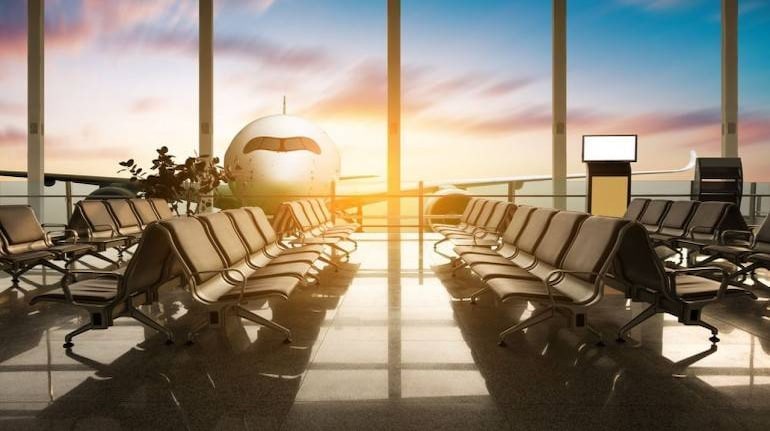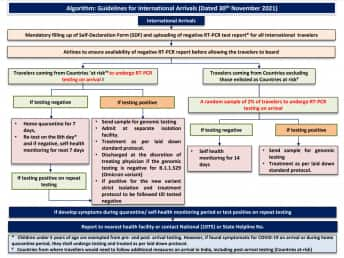



The discovery of a new Covid variant, ‘Omicron’ which the World Health Organization says has the potential to spark infection surges around the globe, has once again forced the Central government to heighten screening of arriving international passengers.
To this end, the Central government has issued new rules for international travellers entering India in order to contain the spread of the new variant.
The State governments of Maharashtra and Uttar Pradesh have come out with their own rules with regard to the entry of international passengers.
Here’s a look at everything international passengers entering India need to know:

Central government guidelines
The Central government has categorised international passengers arriving in India into two groups — from ‘at-risk’ and ‘not-at-risk’ countries — and has issued rules accordingly..
Which countries have been categorised as at risk?
The Central government has classified all European countries, including the UK and 10 other countries — South Africa, Brazil, Botswana, China, Mauritius, New Zealand, Zimbabwe, Singapore, Hong Kong and Israel — as ‘at-risk’ countries, as they have reported a surge in Covid-19 cases in the past few weeks and have also reported cases of the new Omicron virus.
The Central government is also constantly monitoring the spread of the Omicron variant and is expected to update the list of countries in the ‘at-risk’ category as the severity of cases rises.
What are the rules for passengers arriving from ‘at-risk’ countries?
The new travel curbs came into effect on December 1 and list precautionary measures (from the pre-flight to the post-arrival stage for an international traveller) to contain the spread of the Omicron variant in India.
All international passengers must submit 14 days’ travel history and upload negative Covid test results on the Air Suvidha portal.
All travelers coming from these countries will have to undergo an RT-PCR test on arrival in India. Such travellers will be required to wait for their test results at the airport of arrival before leaving or taking a connecting flight.
If they test negative, they will have to be home-quarantined for seven days and again get tested on the eighth day.
If they still test negative, they will be advised to self-monitor their health for another week.
If they test positive, they will be sent to a separate isolation facility and treated there, as per standard protocol, including contact tracing..
Meanwhile, their Covid-19 test sample will be sent for genome sequencing. An extra-careful isolation and treatment protocol will be followed if they test positive for the Omicron variant.
The contacts of positive cases are to be kept under institutional quarantine or home quarantine, monitored strictly by the concerned State Government, as per protocol.
A passenger can exit the airport or take a connecting flight for the final destination once a negative report is received. He/She need not wait for the reports of other co-passengers.
What are the rules for passengers arriving from ‘not-at-risk’ countries?
Passengers arriving from countries that are not ‘at-risk' will also need to submit 14 days' travel history and upload their Covid test results on the Air Suvidha portal. The new travel guidelines are effective from December 1, 2021.
A random 2 percent sample will be collected from passengers arriving from 'not-at-risk' countries.
Travellers undergoing random sampling may give their sample and be allowed to leave.
Airlines/Airports will coordinate with the officials of State/UT Governments to select the passengers for random sampling.
Post-arrival testing can be exempted for a passenger from a not-at-risk country transiting through an at-risk country
How long will passengers have to wait at airports for their Covid-19 tests?
At the moment all international airports in India offer passengers the option of taking two Covid-19 tests: a Rapid PCR test, which costs, on an average, around Rs 4,000, and an RT-PCR test, which costs Rs 500-900 at the airports.
What passengers from ‘at-risk’ countries can expect
All passengers arriving from ‘at-risk’ countries will have to wait at airports for more than three to four hours, on average, to complete testing procedures.
The result of the Rapid-PCR test offered at airports takes about two hours to come in, while the RT-PCR result takes 5-6 hours.
Passengers will not be allowed to leave the airport unless their test results come in.
Passengers arriving from 'not-at-risk' countries:
While passengers arriving from ‘'not-at-risk’ countries will not have to undergo mandatory testing upon arrival, if selected for ‘random testing’ at the airport, the passengers will be allowed to leave the airport before their results come out.
State-specific rules
The Central government is expected to have a discussion with all State governments on December 2 to discuss uniform rules for the arrival of international passengers.
At the moment Maharashtra and Uttar Pradesh have come out with their guidelines for international passengers:
Rules for Maharashtra:
The government of Maharashtra has made it mandatory for all international travellers, irrespective of country of origin, arriving at the Mumbai airport to undergo Covid-19 RT-PCR tests.
It has also called for a mandatory 14-day home quarantine for all international passengers, even if their RT-PCR test result upon arrival is negative.
The State government has also called for mandatory RT-PCR tests for passengers planning to undertake connecting flights after disembarking at Mumbai. Further travel is subject to a negative RT-PCR result.
The State has also asked all passengers coming to Maharashtra from other States to carry negative RT-PCR reports. The tests should have been conducted within 48 hours of their journey.
Rules for Uttar Pradesh:
The Uttar Pradesh government on December 2 announced a fresh set of restrictions for travellers coming into the State.
All international travellers entering UP will have to undergo thermal scanning.
In addition, any travellers from at-risk countries who test positive for Covid-19 on arrival will be isolated at a designated isolation centre.
Their samples will be sent for genome sequencing to confirm if they are infected with the Omicron variant.
The order further stated that all travellers who test positive will be treated at a government facility and their contacts will be traced.
The UP government also ordered that all railway and bus stations in the State have a medical team deployed for Covid testing and sample collection for further testing if required.
What kind of RT-PCR tests have been approved by ICMR at airports?
ICMR has approved the following systems for molecular testing of SARS-CoV-2:
Airports have been directed by the Civil Aviation Ministry to facilitate RT-PCR testing of passengers by extending the required facilities and providing logistics.
Discover the latest Business News, Sensex, and Nifty updates. Obtain Personal Finance insights, tax queries, and expert opinions on Moneycontrol or download the Moneycontrol App to stay updated!
Find the best of Al News in one place, specially curated for you every weekend.
Stay on top of the latest tech trends and biggest startup news.